|
|
|
Sort Order |
|
|
|
Items / Page
|
|
|
|
|
|
|
| Srl | Item |
| 1 |
ID:
144909


|
|
|
|
|
| Summary/Abstract |
The year 2015 witnessed a bifurcated direction for BRICS and emerging economies: all BRICS members' economic growth slowed or stagnated, resulting in more gloomy forecasts for the future. But at the same time, the New Development Bank was set up. The progress of the preliminary institutionalization of the BRICS was mainly driven by China and Russia, which reflected their strong desire to advance a multilateral world order, and to form a new power base for the non-Western countries. The further substantial development of the BRICS depends upon its capability to overcome the structural obstacles among the five countries, amongst which the huge discrepancy between the economies and the heterogeneous nature of the membership are the most prominent ones.
|
|
|
|
|
|
|
|
|
|
|
|
|
|
|
|
| 2 |
ID:
144908
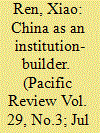

|
|
|
|
|
| Summary/Abstract |
As China is entering into the center stage of the world arena, it has become more proactive in regional and global institution-building. Globally, it has been actively involved in the G20 affairs and will be hosting the 2016 G20 Summit in Hangzhou. Regionally, it came up with a major initiative for a new institution, namely, the Asian Infrastructure Investment Bank (AIIB). This article aims to analyze the new institution's formation, goals and institutional arrangements as well as its implications.
|
|
|
|
|
|
|
|
|
|
|
|
|
|
|
|
| 3 |
ID:
144911


|
|
|
|
|
| Summary/Abstract |
The G20 is in transition from a short-term crisis institution to long-term steering institution, adopting a new ‘G20 + established international organization’ governance approach. In this approach, the main role of the G20 is to set the agenda and build political consensus for global economic governance. The established international organization provides the technical support and facilitates proposal implementation, while the precondition for the G20 institutional transition is that the emerging economies need to participate on an equal footing with the advanced economies. The case of global tax governance is among the few success stories of the G20's institutional transition. Within the ‘G20 + OECD’ governance architecture, the G20 builds the political consensus that the profits should be taxed where they are performed, while the OECD proposes the technical Base Erosion and Profit Shifting Action Plan. In this way, the G20's political leadership and the OECD's technical advantage complement each other, making a giant leap in global tax governance.
|
|
|
|
|
|
|
|
|
|
|
|
|
|
|
|
| 4 |
ID:
144907


|
|
|
|
|
| Summary/Abstract |
The rise of China raises questions about international order and whether traditional power structures will be transformed peacefully or confrontationally. Actively engaged in trade and investment activities with its Southeast Asian neighbourhood, China has been exerting political influence on many Southeast Asian states, cleaving regional cohesion and raising levels of tensity in the region. This article presupposes that within so-called non-traditional security (NTS) areas, there is room for China and Southeast Asian countries to circumvent the political tensions, to some extent. It presumes that NTS issues facilitate greater interaction with/on China for Southeast Asian states, including enhanced European Union (EU)-Association of Southeast Asian Nations (ASEAN) engagement on China. Recognising the increasing and rather underexplored importance of the NTS perspective on the official and scholarly levels, this article delves into the rhetoric of NTS from a European perspective with particular view towards the South China Sea issue to demonstrate the use and utility of the NTS concept in the EU-ASEAN context against the backdrop of China's rise.
|
|
|
|
|
|
|
|
|
|
|
|
|
|
|
|
| 5 |
ID:
144910
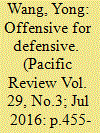

|
|
|
|
|
| Summary/Abstract |
China's Belt and Road initiative came from the combined pressure of slowing down of Chinese economy, US pivot to Asia and deterioration of the relations with neighboring countries after weathering the storm of the Global Financial Crisis of 2008. It also symbolizes a more proactive approach of Chinese new leader Xi Jinping in meeting the expectation on China's international obligation and leadership. Aimed to link Asia, Europe, Africa and Oceania, the initiative provides tremendous opportunities of international economic cooperation. The paper argues that as China's contribution to international public goods, it is in the line of economic liberalism; as China's grand strategy, it is more of defensive than offensive by nature. Despite risks and uncertainties exist, the enforcement will boost China's influence and position in regional and international institutions. US should consider making more strategic space to the rising China, and a better coordinated China–US relations will make Asia Pacific a safer and more promising region.
|
|
|
|
|
|
|
|
|
|
|
|
|
|
|
|
| 6 |
ID:
144905
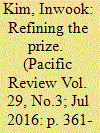

|
|
|
|
|
| Summary/Abstract |
Since China became a net oil importer in 1993, oil refineries have played integral roles in China's quest for oil security. And yet, the capacity, security, and configurations of refineries were rarely featured in the discussions about China's oil policy. To fill this gap, this paper explains the basics of refinery economics and technology, and details the development in China's refining industry since the early 1990s. By taking refineries into consideration, it then revisits and reassesses the existing literature regarding the motives and drivers behind China's foreign oil policy, its effectiveness, and the political interactions between China and crude oil producers.
|
|
|
|
|
|
|
|
|
|
|
|
|
|
|
|
| 7 |
ID:
144906


|
|
|
|
|
| Summary/Abstract |
Regional organization in Oceania has a history dating to the early post-war period while the rise of regional identities occurred somewhat later in the context of independence. This paper analyzes regionalization processes and accompanying discourses of regionalism relating to both pan-Pacific and more recent sub-regional developments. It pays particular attention to the dynamics of identity politics in the post-independence period and how these have played out in tensions within and between the varying exercises in regionalization.
|
|
|
|
|
|
|
|
|
|
|
|
|
|
|
|
| 8 |
ID:
144903
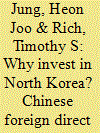

|
|
|
|
|
| Summary/Abstract |
North Korea has been regarded as the least likely place to attract foreign investors due to its poor infrastructure, policy reversals, and totalitarian regime. However, the recent growth of Chinese direct investment in North Korea has drawn much attention due to its implications for the North Korean economy and regional stability. This research provides an analytical framework by considering two fundamental issues that any foreign investor takes into account when making an investment decision: property rights protection and profitability. It examines how recent changes have influenced these two issues, which, in turn, shaped the incentive structure of Chinese private investors.
|
|
|
|
|
|
|
|
|
|
|
|
|
|
|
|
| 9 |
ID:
144904
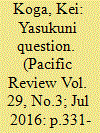

|
|
|
|
|
| Summary/Abstract |
This article argues that the problem of the Yasukuni Shrine between Japan and South Korea stems from the differential growth of Yasukuni discourses in both countries after the Pacific War. While the Japanese post-war discourse split into three schools of thought – Nationalists, Moderates, and Progressives – South Korean discourse has been consolidated into one dominant anti-Yasukuni perspective, largely shaped by Japan's political discourse and actions from the 1980s. This divergence created the perception gap between the two, resulting in a diplomatic obstacle that hinders Japan--South Korea strategic cooperation.
|
|
|
|
|
|
|
|
|
|
|
|
|
|
|
|
|
|
|
|
|